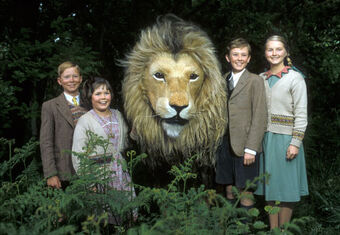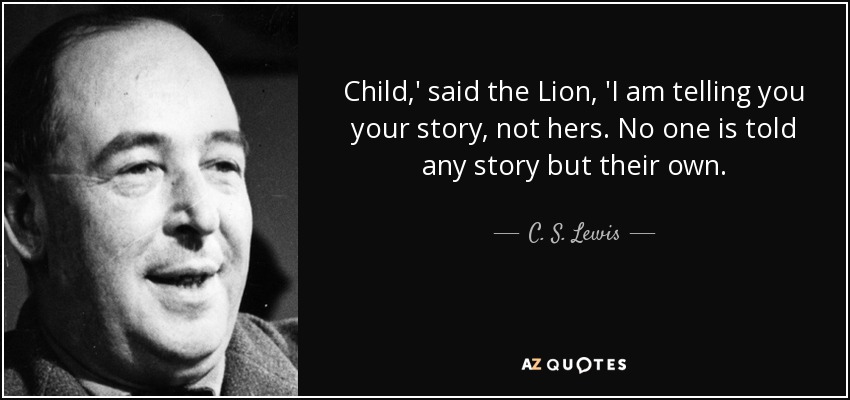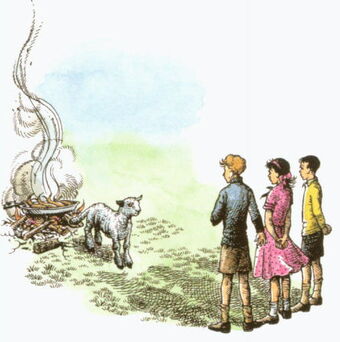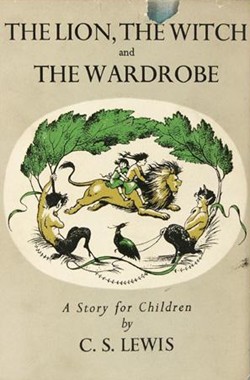I have always been an avid reader. I came from a home where, every year, my parents had a bet to see who read the most books, and the loser had to buy the winner a candy bar on New Years Eve! My mom usually won, hitting into the upper 90's (as in, she read 90-some books in the year), and my dad would be pretty close behind her.
Favorite books are like old friends you come back to. They seem to stand the test of time in your life. A particular series that fits this description to me is The Chronicles of Narnia, by C.S. Lewis. These books are allegorical, about the Christian life. I have read this series numerous times growing up, and every time, I get something deeper from them for my own life. I'm going to interact with them in this post.
C.S. Lewis originally wrote the series from 1950-1956. He started with the most famous book, The Lion, The Witch, and the Wardrobe. In this story, we meet the Pevencie siblings (though we don't learn their last name until a few books later), Peter, Susan, Edmond and Lucy. They are evacuees from London during World War II. They go to live in the country with Professor Kirk. In his house, they discover a wardrobe in a spare room, which leads them into the fantasy world of Narnia. In this world, they becoming involved in a battle between good and evil, and see Righteousness conquer. The Christ figure in the series, a lion named Aslan, dies to redeem Edmond (who has become a traitor), and rises again, ultimately defeating evil in Narnia, and establishing the siblings and kings and queens. This was the beginning of a series that even Lewis didn't foresee the ending of.
I, personally, became aware of The Lion, The Witch, and the Wardrobe in 1988, in grade school. BBC made a television miniseries of the book. I remember the commercial looked very exciting to me. Showing scenes of the film, an exciting voice raised the intrigue, saying, "Two sons of Adam...two daughters of Eve...four thrones..." I was hooked on the idea of this story! I thought the two sons of Adam were Cain and Abel, and concluded the story was about the Bible. I didn't know who the girls were, since we don't know Adam and Eve's daughter's names. I was convinced it would show Cain killing Abel, and I hoped it wouldn't be too gross or scary. I also wondered why the kids in the scenes weren't dressed like Bible characters were "supposed" to dress. They looked downright 20th century to me! I really wanted to watch this movie! I begged my mom, but she told me I had to read the book first! You'd better believe I did!
 |
| 1988 Cast of The Lion, The Witch and the Wardrobe |
I loved the story. Every time I saw a lamppost, I thought about the lamppost they found when they first entered Narnia through the wardrobe. I loved the biblical truths contained in this story. I loved good triumphing over evil. However, it wasn't until a few years later, when I was in junior high, that I read the rest of this wonderful series. CS Lewis followed the first book with three others that continue the story of the Pevencies in Narnia: Prince Caspian, The Voyage of the Dawn Treader, and The Silver Chair (which is actually about their cousin, to whom we are introduced in the previous book). In these books, we get to know the Pevencies, and also see how Narnia develops. Most importantly, we are introduced more deeply to Aslan. The experiences the characters have relate to the Christian life. We learn that the Pevencies' reign in Narnia is the Golden Age, the best time in Narnia's history. Their last name is not mentioned until The Voyage of the Dawn Treader. In fact, I didn't even remember them having a last name when the 2005 movie came out, and actually used their last name. I had wondered if the script writers had made up a last name, but upon re-reading the series, I realized it was in there.
| 2005 version of the Lion, The Witch and the Wardrobe |
After The Silver Chair, Lewis went back in the narrative and wrote The Horse and His Boy which introduces some new characters, has some very in-depth experiences with Aslan, and also gives a look into what Narnia was like during the Golden Age, when Peter, Susan, Edmond and Lucy were reigning. This book is really the only view we get into that time (other than a brief description at end of The Lion, The Witch and the Wardrobe), and that alone would make it a worthwhile read. However, the story itself is also priceless. This became book five in the series, even though it takes place within the time described in the first book.
After this, Lewis wrote a sixth book about Narnia, known as The Magician's Nephew. This is my second favorite in the series (my favorite being The Voyage of the Dawn Treader), and is the story about how Narnia started in the first place. This book has Professor Kirk, from The Lion, the Witch and the Wardrobe, as a little boy named Digory Kirk. Digory and his friend Polly are manipulated by his magician wannabe uncle into discovering other worlds. They encounter an evil empress named Jadis in a dying empire known as Charn, and they inadvertently bring her back to our world. In trying to get her back to her own world, they accidentally bring her to Narnia the very day of it's creation. This story is an allegory about Creation, and sin entering the world. It is deep and meaningful, but also quite funny, with Digory's Uncle Andrew (the mad scientist/magician) trying to justify what he is doing the whole time. Since this is the sixth book written in the series, Lewis writes with more authority about Narnia. He clearly knows it, and Alsan, much better than he did when he wrote the first book. Jadis becomes the White Witch, and she is given a very different history in The Magician's Nephew than she was briefly given five books earlier in The Lion, The Witch and the Wardrobe. However, since that description was so short and minimal, the inconsistency was probably not noticed when The Magician's Nephew was published five years later.
 |
After these two books were written, Lewis jumped back into the original chronology and wrote a seventh and final book to the series, The Last Battle. This is an allegory about end times, Christ's return, and our future with Him forever. It is a beautiful story with a hope-filled, inspiring ending. Not only does it continue to follow the previous characters, but also incorporates the character he introduced in The Horse and His Boy and The Magician's Nephew.
Some years later, in 1994, the series was republished in a different order. The Magician's Nephew was put as book one, and The Horse and His Boy was put as book 3, taking place directly following The Lion, The Witch and the Wardrobe. The only real difference is the placement of these two books. I recently asked people who read my author page to share their favorite order--the original or the newer, chronological order. I enjoyed people's responses. The biggest opinion I seemed to get was that most seemed to prefer the originally-published order. Most preferred to have The Lion, The Witch and the Wardrobe as the first book in the series. One reader pointed out that Lewis' writing develops with the series, and I agree with that. As I said, there is much more familiarity with it in The Magician's Nephew, so to have that one first, then having The Lion, The Witch and the Wardrobe after it does sort of seem like a step backwards. Another person pointed out that, when we give unbelievers a Bible, we encourage them to read the gospel of John first, because they might not read anything else, and they need that so desperately for the rest to make sense. In the same way, she said, readers need to read the redemption story first, which would make The Lion, The Witch and the Wardrobe book one. Also worth noting, the character of Digory Kirk was already established in the Lion The Witch and the Wardrobe as an old, unmarried professor. This rules out his ever marrying Polly Plummer, who is his friend and comrade in The Magician's Nephew. In reality, I believe Lewis would have had them marry had he not already established this, because in his non-fiction book The Four Loves, he states that it is unlikely that two friends of the opposite sex would remain good friends without falling in love. Sadly, he precluded that possibility for Digory and Polly.
To me, personally, I can read The Magician's Nephew as book one or book six without any real difference of opinion. It fits both ways. However, I do have more of an opinion about The Horse and His Boy. I prefer the "new" chronological order for that one. I think it is very powerful coming right after The Lion, The Witch and the Wardrobe and before Prince Caspian. The Horse and His Boy illustrates what Narnia was like during the Golden Age. Reading that, and then following it up with their return to a desolate Narnia hundreds of years later in Prince Caspian is very substantial. The contrast is very blunt, and makes the point stronger.
 |
Some powerful points I take from the series:
*One thing I love in the 2005 movie is an added scene that takes place after the ending credits. It shows Lucy slowly, almost shyly, approaching the wardrobe, attempting to return to Narnia. Just as she gets there, the Professor stops her and says, "I don't think you'll get back in that way." She looks startled and turns to him. With longing in his eyes, the Professor adds, "You see, I've already tried." Even without knowing the story of The Magician's Nephew, you gather that he's had experiences there that brought him much joy--experiences he would love to relive, just as Lucy is trying to do. Lucy asks him, "Will we ever go back?" He replies, "I expect so, but it will probably happen when you're not looking for it. All I'm saying is to keep your eyes open." Contentedly assured, Lucy takes his hand and they walk away. Behind them, the wardrobe opens slightly, light comes out, and Aslan roars. His presence still hangs in the air, even though it isn't time for them to return to Narnia. And I relate to that. I have had moments in my life that I consider "preludes to Heaven" where God's joy hovered all over me, and everything seemed right and perfect. These times never last very long, but they serve as a reminder for what waits beyond this life. One such time for me was growing up in a close-knit church family. For a few years, it really seemed perfect, and that was a time when God shaped my ideals of life. Another "prelude" was my first year as a summer missionary in high school. God just gives us those moments when we need them. But we can't go back and try to recreate them on our own, just like the Professor and Lucy can't get back into Narnia through the wardrobe. It happens when we're not looking for it...but Jesus is still there.
![2015] Clayton Kirby: Lucy's Journey: aslan, beavers, edmund, en ...](https://9044c4.medialib.edu.glogster.com/lijWt86AMUnXEh66voyY/media/36/36b8319e2d8cf4cda271d04c73a5491b3cbe1da0/1401417918554.jpg) |
*In The Horse and His Boy, a young man named Shasta has lived all his life believing himself to be an unloved Calormen child of an abusive father, when instead, he is stolen royalty. As he comes to understand who he is (during an exciting escape), he encounters Aslan, and learns that the hardest experiences of their journey and of his life have been times Aslan was sovereignly working for his good. It gives me a different perspective of my own experiences. Aslan also tells both Shasta and Aravis, "I tell no one any story but his own." God doesn't owe me an explanation how He deals with others (even though I sometimes want one!).
 |
*In Prince Caspian, Lucy is so excited to see Aslan again, in the midst of finding Narnia in decay. When it turns out Aslan has different plans than Lucy, she says "I thought you would come roaring in and frighten all the enemies away--like last time. And now, everything is going to be horrid." Aslan replies, "It is hard for you, little one, but things never happen the same way twice. It has been hard for all of us in Narnia before now." Lucy pulls it together and says, "I'm sorry Aslan. I'm ready now." He tells her, "Now, you are a lioness, and now all Narnia will be renewed." That is so deep and rich to me. Sort of like what I said about "preludes" we can't recreate the workings of God from the past. God has new plans. If God worked by patterns and formula, we wouldn't need faith. We have to trust Him and follow His leading, even if things aren't working the same way as we had hoped. We have to believe God has a plan, even when we can't see. Aslan definitely does in this book, as can be seen by the end. And, as Aslan promised Lucy, we find renewal when we trust and obey. In fact, we not only find renewal, but bring it to the situation. I'm reminded of the phrase, you can't live on past victories. In a sense, that's true, because things don't happen the same way again. But, we aren't to forget those victories. In other places in this book, it refers to the Pevencies being encouraged by seeing sites where they once won victories. I think we're supposed to remember, but also trust the Lord for what is to come next.
 |
*In the book The Voyage of the Dawn Treader, when Lucy and Edmond are told at the end that they will never return to Narnia, they are devastated. "It isn't Narnia, you know," Lucy tells him. "It's you. We shan't meet you there. How shall we live never meeting you?"
"But you shall meet me, dear one," says Alsan.
"Are--are you there too, Sir?" asks Edmond.
"I am," replies Aslan. "But there I have another name. You must learn to know me by that name. This was the very reason why you were brought to Narnia, that by knowing me here fro a little, you may know m better there."
I used this passage in my Bible College graduation speech (I was salutatorian). When we have to leave places or stages of life, we need to find the Lord in our new place. That's the whole point. Each stage of life--everywhere we go---everyone we meet--is meant to show us Jesus, and that by knowing Him where we are, we'll know Him better in the next step. Romans 8:29-30 tells us that God makes us like Jesus. We are predestined, called, justified and glorified.
 |
*In The Magician's Nephew, Aslan says of Uncle Andrew, "Oh Adam's sons, how cleverly you defend yourselves against all that might do you good!" That convicts me. I have let fear keep me from certain things in my life. This phrase has stuck with me. Whenever I'm tempted to walk away from a situation that might be good for me, I am reminded of this, and I often choose to stay.
*And who can beat the end of The Last Battle: ‘There was a real railway accident,’ said Aslan softly. ‘Your father and mother and all of you are???as you used to call it in the Shadowlands???dead. The term is over: the holidays have begun. The dream is ended: this is the morning.’??
And as He spoke He no longer looked to them like a lion; but the things that began to happen after that were so great and beautiful that I cannot write them. And for us this is the end of all the stories, and we can most truly say that they all lived happily ever after. But for them it was only the beginning of the real story. All their life in this world and all their adventures in Narnia had only been the cover and the title page: now at least they were beginning Chapter One of the Great Story which no one on earth has read: which goes on for ever: in which every chapter is better than the one before.
That is all I have to say. What are your favorite life lessons from this series?


No comments:
Post a Comment